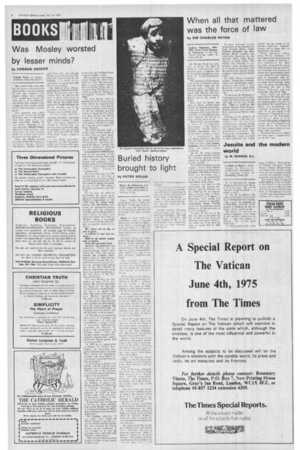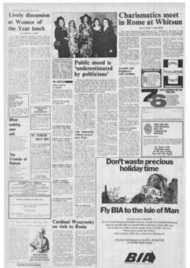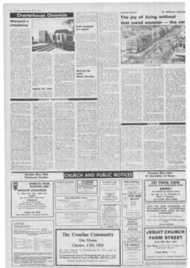Page 6, 16th May 1975
Page 6

Report an error
Noticed an error on this page?If you've noticed an error in this article please click here to report it.
Tags
Share
Related articles
Nothing Nice To Say About
Has Sir Oswald Mosley Read " Rerum Novarum"?
Mosley's Fall From Grace
British Union Of Fascists ; And Catholics The Two...
Mosley Memories
Was Mosley worsted by lesser minds?
by CONRAD ASCHER
Oswald Mosley by Robert Skidelsky (Macmillan £6.95) "How comes it that a man who had been given such talents and opportunities, who was inspired by such high ambition, such dogged energy, such burning faith. should have missed the main objects of his ambitions. should have been worsted in the struggle by lesser minds, should have failed. ultimately. to make good?"
This question was asked about Lord Curzon by Harold Nicholson and it could equally have been asked about Curzon's son-in-law, Mosley. So says Robert Skidelsky in his new biography Oswald Mosley, which is a long, scholarly, wellresearched and most readable book, but it never quite comes to terms with the question.
First, was Mosley worsted by lesser minds? His was the era of Lloyd George, Ramsay MacDonald. Stanley Baldwin and Churchill. and though Mosley was much praised at the time and is now praised by Mr Skidelsky it is sutely an exaggeration to equate him with any of these leaders.
The highest office Mosley achieved was Chancellor of the Duchy of Lancaster, and in the Labour Party he had no real basis of power from which to strike at the party leadership. In 1929, whe he had hoped to be appointed Foreign Secretary, he in fact became one 'of the economic advisers to J. H. Thomas. the Lord Privy Seal.
"A sort of ginger assistant,"
declared Churchill, "and more ginger than assistant I doubt not." The famous anecdote is related of Thomas that one morning after an alcoholic night he remarked: "I've an 'ell of an 'ead" and was told by Lord Birkenhead: "Take a couple of aspirates."
It was Philip Snowden, Chancellor of the Exchequer, rather than Thomas, who caused Mosley to resign from office as he would not find State funds to finance public works.
Mosley had not been happy, either, during his earlier brief spell as a Tory. He chose that party to enter politics almost much as Walter Elliott who at the end of the 1914-18 war was asked to stand for Parliament and replied: "Certainly. Which party?" Nor had Mosley risen to prominence in the Conservative Party before he resigned from it. It is. of course, true that he was only in his late thirties when he left the orthodox political parties to found the New Party and then entered the British Union of Fascists: but one wonders if he had stayed inside party politics whether he would have become a party leader or a Prime Minister.
"By 1930 Mosley had a firmer grasp of what needed to he done than any other politician in Britain." This view expressed by Mr Skidelsky, who calls economics "that least congenial of subjects" ignores that Mosley's economic thinking was not particularly original. It owed much to reading Keynes and to the opinions of the Independent Labour Party and other sources. Even Lloyd George had proposed a £145 million project of road building in 1929 in a publication entitled " We Can Conquer Unemployment."
We must remember that Mr Skidelsky is writing a. biography of a man who is alive and still thinking politically, and with whom he spoke extensively and got on well. This makes a detached assessment more difficult.
Yet he does not shirk in describing the great, main defect about his subject. This is Mosley's association in the 1930s with the violent street scenes, the anti-Semitic outbursts, the uniformed political parades and the arrogant strutting and marching which is what most people now remember when they think of Mosley. There is naturally much more to Mosley than this. but carrying the stamp of this defect:
His virtues else be they as pure as grace,
As infinite as man may en Shall in the general censure take corruption,
From that particular fault.
Mosley's anti-Semitism was insincere. There are no
pronouncements against Jews
hefore the 1930s, and indeed Jewish arid Catholic news
papers were at times not un sympathetic towards him as a potential bulwark against Com munism. Harold Laski helped him in the 1923 election in Harrow, and Mosley has stated
there were Jewish candidates in the New Party in the 1931 General Election.
Nor was Mosley so outspoken as many of his sup porters. He said his opposition was based on the fear that Jewish pressure would lead Bri tain into a war against Germany. But none of this can excuse Mosley's "quarrel with the Jews" as he now calls it.
He led people who used the vilest epithets and often appealed to the lowest elements. Mr Skidelsky well quotes Virgil: "If I cannot move the Gods I will stir the lower world to uproar."
In 1936 Mosley proposed the deprivation of citizenship and the deportation of Jews for "anti-British" conduct. In 1918, as successful parliamentary candidate for Harrow, he wanted the deportation of German aliens. "They had brought disease amongst them, reduced Englishmen's wages, undersold English goods and ruined social life."
In 1959, as an unsuccessful candidate for North Kensington. he advocated compulsory free passage back to the West Indies for immigrants, together with heavy British investments to make the West Indies prosperous.
It is tempting to believe that Mosley and his Fascism were bound to fail in Britain before 1939 because of the principles of toleration and sound political sense of the population.
But even with the passage of the Public Order Act in 1936, the abolition of political uniforms and Mosley's difficulties in holding meetings, he attracted a sympathetic audience of 20.000 to Earls Court in July, 1939, and received favourable publicity at that time in the national Press.
If there had been no war and if he had not been interned, how would Mosley have fared in a General Election in 1940 if there had been a new economic depression?
Mr Skidelsky observes: "If any single factor killed off British Fascism it was the war. not the British political culture. The war defeated the Fascist Powers on the battlefield. It also brought to an end the economic horror that had made Fascism a world force."
This book provides important things to ponder in our present C ircumstances.
blog comments powered by Disqus











